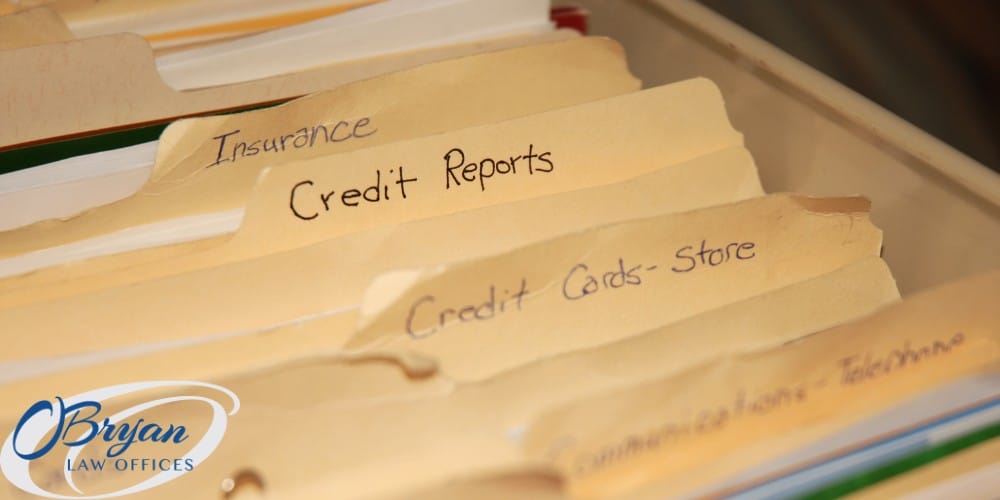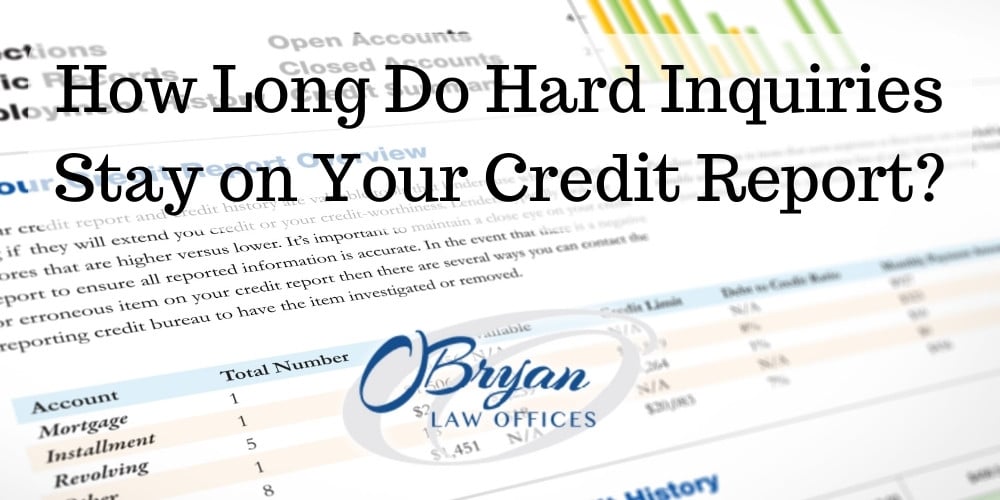As you’re probably aware, many different actions and inactions can affect your credit score and be listed on your credit report. One small detail that regularly affects people’s credit scores is the hard inquiry process. Even though one hard inquiry may not drop your score that much, having multiple hard inquiries can be a problem. So, how long do hard inquiries stay on your credit report, and what can you do to mitigate the damage?
At O’Bryan Law Offices, we pride ourselves on our dedication to educating consumers about debt and finances. Our Kentucky bankruptcy lawyers have decades of experience helping Kentucky and Southern Indiana residents file for consumer bankruptcy. If you’re struggling with debt and you need a way out, bankruptcy could be the perfect solution for you. To schedule a free consultation with us, please call our Louisville office at 502-339-0222 today.
What Is a Hard Credit Inquiry?
Hard inquiries, otherwise known as “hard pulls,” happen when you try to apply for new lines of credit. For example, if you want to apply for an auto loan or credit card, the creditor in that situation will conduct a hard inquiry on your credit reports. This basically means that they want to look at your credit history in order to determine if you’re a safe or risky borrower. Having one hard inquiry on your credit report may not do much to your score, but multiple inquiries could significantly lower your score. So, what’s the difference between hard inquiries and soft inquiries?
Hard Credit Inquiry vs Soft Credit Inquiry
Generally, financial institutions (such as banks or lenders) will conduct hard inquiries on your credit reports before they decide whether or not to lend to you. You also have to approve these hard inquiries before they happen, which means you’ll know when to expect them. They will show up on your credit report, potentially drop your score, and remain there for a certain period of time. Keep in mind that others can see hard credit inquiries on your credit reports.
Unlike hard inquiries, soft inquiries typically happen when someone wants to use your credit report as a background check rather than as a lending decision. Some employers like to run a soft inquiry on potential hires to get an idea of how responsible they are. A soft inquiry will not affect your credit score, and it will be visible only to you on your credit report.
Hard Credit Inquiry and Soft Credit Inquiry Examples

If you take a look at your own credit report, you may be able to identify certain hard and soft inquiry instances. Chances are, if you had to give a lender permission to look at your credit report, it was a hard inquiry. Below, we provide common examples of both soft inquiries and hard inquiries.
Examples of Soft Credit Inquiries
- Checking your own credit report and credit scores
- Background checks during employment applications
- Getting a promotional credit card offer
- Getting prequalified insurance rates or quotes
Examples of Hard Credit Inquiries
- Applications for auto loans
- Applying for a student loan
- Mortgage applications
- Applications for new credit cards
- Apartment rental applications
- Applications for other personal loans
Does Checking Your Own Credit Score Count as a Hard Inquiry?
No. When you check your credit score, you may see that a soft inquiry shows up on your credit report. Many people still think that checking your own credit score will hurt it, but this isn’t the case. You can often log into an app or a website online to check this information. Even though your credit reports will show an inquiry, it won’t hurt your credit score. It also cannot be seen by anyone but you.
Additionally, regularly checking your credit scores is a great way to promote financial literacy within yourself. Checking your credit score with each of the three major credit bureaus is a great way to stay on top of the changes in your financial accounts.
How Long Do Hard Inquiries Stay on Your Credit Report?

When hard inquiries happen, they may only truly affect your score for a few months. You can very easily recover from any small drop in your credit score that it causes. Also, hard inquiries don’t stay on your credit reports for as long as other financial events, such as bankruptcy or foreclosure. A hard inquiry can stay on your credit report for up to two years, then it falls off.
How Does a Hard Inquiry Affect Your Credit Score?
One hard inquiry into your credit history should only drop your credit score by up to five points. However, most people see a much smaller drop than that. This dip is temporary, as you’ll only have to wait a few months before seeing your score go back up. However, having more than one hard inquiry in a short period of time could be more damaging to your score.
For example, if someone tries to apply for several new credit cards back to back, all these hard inquiries will show on their credit report and drop their score.
How to Reduce the Impact of Hard Inquiries

Luckily, there are many ways you can soften the blow of a hard inquiry. One way you can do this is through simple planning. Check for prequalification on credit cards before you start applying, and only apply for new credit card balances and other forms of credit when you really need to. Also, try to shop around for one type of credit at a time. For example, shop around for the best home loans, but don’t also shop for new credit cards and auto loans.
Doing your research before you shop around can be a real lifesaver. It can help you minimize the number of hard credit checks you’ll undergo, as well as save you time and money. Other ways you can minimize the impact of a hard inquiry are to have good credit behaviors. Try to keep old credit accounts open, have a healthy credit mix, and keep your total amount of debt low.
Can Hard Inquiries Be Disputed?
Sometimes. Each hard inquiry must be authorized by you. Every time you see a hard inquiry on your credit report, verify that you allowed the credit check. If you did, then it is a legitimate credit check that you cannot dispute. If you did not approve the hard inquiry, then it is considered unauthorized. You can dispute unauthorized inquiries with whichever credit bureau created the report. Once the credit bureau learns the inquiry was unauthorized, they should remove it from your reports.
How to Dispute Hard Credit Inquiries
If you believe that a hard credit check on your credit history was unauthorized or inaccurate, you can and should take steps to dispute it. First, get copies of your credit reports. When you find something inaccurate or unauthorized, you could contact the lender responsible for the check. If you contact them directly, you may be able to avoid filing a formal dispute.
Unfortunately, contacting the original lender doesn’t always solve the problem. When this happens, we recommend filing a formal dispute to the appropriate credit bureau. Try to avoid submitting the dispute over the phone, as this won’t create a paper trail. File online or by mail and be sure to keep a copy of the dispute letter for yourself.
While you write your dispute letter, you’ll want to include the following information.
- Your name, date of birth, and address
- Include the date on which you write the letter
- Your social security number
- Include the name of the credit bureaus that recorded the disputed information
- Include the date on which the disputed information appeared, as well as the company or institution that initiated the credit check
- A clear and official request to remove the inquiry, as well as the reasons for removal
- Include any and all supporting documents, but make sure you only include copies of the originals. You never want to submit original copies of documents to anyone.
How Many Hard Inquiries Is Too Many?
While there is no exact number that counts as too many hard inquiries, one or two is pretty normal when applying for a mortgage or car loan. Having five or six hard inquiries, however, could signal to lenders that you’re riskier than the average person. One way to avoid having several hard inquiries on your report at once is to try rate shopping.
There’s no shame in shopping around for a home or auto loan. In fact, we encourage it! Rate shopping can help you find the right lender for your situation, saving you money in the long run. Most of the major credit scoring models will automatically group multiple hard inquiries within 15-45 days into one inquiry. If you decide to shop around, try to stick to the same or similar types of credit. This will help each credit scoring model in grouping together hard inquiries into one.
Will My Credit Score Increase When a Hard Inquiry Falls Off?

When hard inquiries drop off your credit report, you’re unlikely to see a change in your score. If the score does change, it will be very minor. This is because one or two hard credit checks will have a negligible impact on your credit score, if any. Any influence that hard inquiries have on your score tends to fade after a few months. Once they fall off after two years, your credit scores may not change at all.
Contact O’Bryan Law Offices Today
At O’Bryan Law Offices, we strive to not only help our clients achieve debt relief in Kentucky and Southern Indiana, but we also want to help them become financially literate. Understanding how your credit record works and what affects your overall credit score can help you maintain control of your finances. If you’re struggling with debt or if you need financial advice, O’Bryan Law Offices are here for you. Our Kentucky bankruptcy lawyers can help you take back control of your finances and achieve better financial standing. To schedule your free consultation with us, please call our office at 502-339-0222 today.


